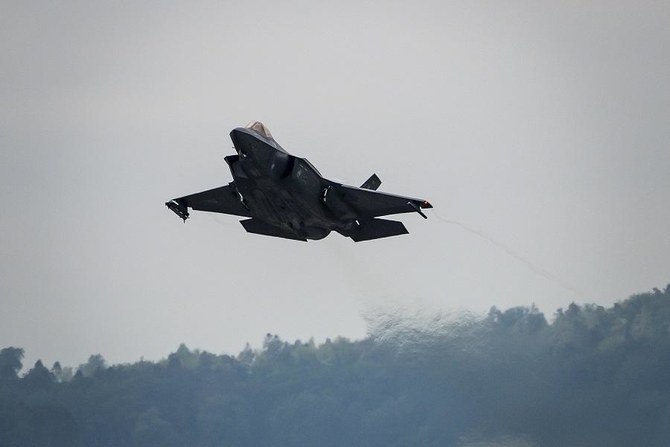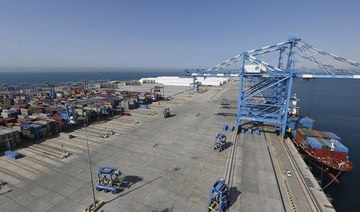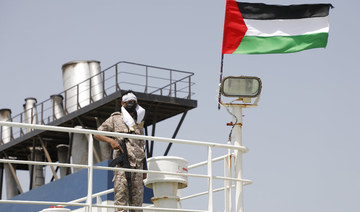WASHINGTON: The Senate fell short Wednesday in trying to halt the Trump administration’s proposed $23 billion arms sales to the United Arab Emirates, despite bipartisan objections to the package of F-35 fighter jets and drones stemming from a broader Middle East peace agreement.
Senators argued the sale of the defense equipment, which Secretary of State Mike Pompeo formally authorized last month after the Abraham Accords normalizing relations with Israel, was unfolding too quickly and with too many questions. The administration has billed it as a way to deter Iran, but UAE would become the first Arab nation — and only the second country in the Middle East, after Israel — to possess the stealth warplanes.
“Can a lasting peace be purchased with more weapons?” said Sen. Rand Paul, R-Kentucky, in a speech ahead of the vote.
Congress has shown a willingness to confront Trump in one main area — on defense policy. But on Wednesday the effort to turn back the arms sales failed to reach the 51-vote majority needed for passage. Trump was expected to veto the two resolutions anyway.
The showdown over the sale, alongside sweeping bipartisan support for the annual defense bill despite Trump’s threats to veto it, is potentially a final power play between the executive and legislative branch in the final weeks of Trump’s presidency. The Senate will take up the broader defense bill soon.
Action is halted for now, though the House, where Democrats have control, would likely be able to pass them easily.
Sen. Chris Murphy, D-Connecticut, said in a statement after the vote he was eager to work with President-elect Joe Biden’s administration “to take a closer look at each of these sales before any transfers are completed.”
Murphy said the UAE’s track record in war-torn Yemen and Libya and its “complicated” relationships with China and Russia raise more questions than answers.
“I’m not here to say that we shouldn’t be in the security business with UAE,” Murphy, a member of the Senate Foreign Relations Committee, said during the debate.
But, he said, “without resolving those issues, is this the moment to be selling for the first time ever F-35s, armed drones into the heart of the Middle East?”
The arms sale emerged after the US brokered the Abraham Accords to normalize relations between the UAE, Bahrain and Israel.
In notifying Congress last month, Pompeo said the authorization of the sale was in recognition of the “deepening relationship” with the UAE and its need to deter threats from Iran.
Pompeo said the “historic agreement” reached with the Abraham Accords offered a “once-in-a-generation opportunity” to transform the region’s “strategic landscape.”
The sale, worth up to $23.37 billion, includes dozens of F-35s, advanced armed drone systems and a package of air-to-air and air-to-ground munitions. It may not become final until next year.
Sen. Bob Menendez of New Jersey, the top Democrat on the Foreign Relations Committee, said a list of questions senators sent to Pompeo and then-Defense Secretary Mark Esper about the arrangement remains unanswered.
A classified briefing for senators did not appear to adequately answer their questions.
“We must assert our congressional prerogative,” Menendez said. Voting “sends a message to the executive branch.”
Israeli officials have previously expressed some concern about an F-35 sale. But in October, Israeli Prime Minister Benjamin Netanyahu appeared to confirm Israel’s consent.
On Wednesday, senators narrowly rejected one resolution to disapprove of the F-35 sales, 47-49, and the other over the sale of armed drones, 46-50, in procedural votes largely along party lines. That’s far short of the two-thirds majority that would have been needed to overcome a potential presidential veto.
Even after Wednesday’s setback, Congress is poised to approve the sweeping annual defense bill despite Trump’s objections.
Trump has warned he would veto the bill over a provision to study stripping the names of Confederate leaders from US military bases. He also wants lawmakers to include an unrelated provision to clamp down on the big technology companies over what Republicans, and some Democrats, say is unfair treatment on social media platforms like Twitter and Facebook. But lawmakers say the tech provision doesn’t belong in the defense policy bill.
=
US Senate falls short of halting Trump’s $23bn arms sales to UAE
https://arab.news/z9vkz
US Senate falls short of halting Trump’s $23bn arms sales to UAE

- Senators argued the sale of the defense equipment was unfolding too quickly and with too many questions.
- The sale includes dozens of F-35s, advanced armed drone systems and a package of air-to-air and air-to-ground munitions
Iran’s President Raisi and FM Amir-Abdollahian join a long list of world leaders who have perished in air disasters

- The duo perished on Sunday when the helicopter carrying them crashed in a mountainous region of northern Iran
- At least two dozen top officials and serving heads of state have died in plane and helicopter crashes over the past century
LONDON: Iranian President Ebrahim Raisi was confirmed dead on Monday after search-and-rescue teams found his crashed helicopter in a mountainous region of northern Iran, close to the border with Azerbaijan.
Killed alongside Raisi were Foreign Minister Hossein Amir-Abdollahian and seven others, including the crew, bodyguards and political and religious officials.
Iran’s Supreme Leader Ayatollah Ali Khamenei has assigned Vice President Mohammad Mokhber to assume interim duties ahead of elections within 50 days. Ali Bagheri, the country’s one-time top nuclear negotiator, was appointed as acting foreign minister.
Iranian authorities first raised the alarm on Sunday afternoon when they lost contact with Raisi’s helicopter as it flew through a fog-shrouded mountain area of the Jolfa region of East Azerbaijan province.
Raisi had earlier met Azerbaijan’s President Ilham Aliyev on their common border to inaugurate a dam project.
On the return trip, only two of the three helicopters in his convoy landed in the city of Tabriz, setting off a massive search-and-rescue effort, with several foreign governments soon offering help.
As the sun rose on Monday, rescue crews said they had located the destroyed Bell 212 helicopter — a civilian version of the ubiquitous Vietnam War-era UH-1N “Twin Huey” — with no survivors among the nine people on board.
State television channel IRIB reported that the helicopter had “hit a mountain and disintegrated” on impact.
Analysts have highlighted concerns about the safety of Iran’s civilian and military aircraft, many of which are in a poor state of repair after decades of US sanctions deprived the nation of new models and spare parts.
Iran has kept its civil and military aviation fleets flying during its isolation since the 1979 revolution through a combination of smuggled parts and reverse-engineering, according to Western analysts.
“Spare parts would have definitely been an issue for the Iranians,” Cedric Leighton, a retired US Air Force colonel, told CNN.
“In this particular case, I think this confluence of spare parts, because of the sanctions, plus the weather, which was very bad over the last few days in this particular part of northwestern Iran.
“All of that, I think contributed to a series of incidents and a series of decisions that the pilot and possibly even the president himself made when it came to flying this aircraft … And unfortunately for them, the result is this crash.”
Sunday’s incident is only the latest in a long history of air disasters that have claimed the lives of world leaders since the dawn of aviation.
One of the first instances of a serving leader or head of state to die in an air accident was Arvid Lindman, the prime minister of Sweden, whose Douglas DC-2 crashed into houses in Croydon, south London, while attempting to take off in thick fog on Dec. 9, 1936.
As the age of aviation took off during the interwar period, more and more leaders began taking to the skies for diplomatic visits and to touch base with the more distant corners of their dominions.
On Sept. 7, 1940, Paraguayan President Jose Felix Estigarribia died in a plane crash just a year after taking office, followed in 1943 by Poland’s prime minister in exile, Wladyslaw Sikorski, who died on July 4, 1943, when his B24C Liberator crashed into the Mediterranean shortly after taking off from Gibraltar.
While aviation technology and safety rapidly advanced after the Second World War as more and more countries began establishing their own air forces and civilian commercial fleets, technical faults, bad weather, and foul play continued to claim lives.
On March 17, 1957, Ramon Magsaysay, the president of the Philippines, was killed when his plane crashed into Mount Manunggal in Cebu. A year later, on June 16, Brazil’s interim president, Nereu Ramos, died in a Cruzeiro airline crash near Curitiba Afonso Pena International Airport.
Africa has also seen its share of air disasters. On March 29, 1959, Barthelemy Boganda, president of the Central African Republic, died when his Atlas flying boxcar exploded in midair over Bangui.
Then, in 1961, Swedish economist and diplomat Dag Hammarskjold, who served as the second secretary-general of the UN, died when his Douglas DC-6B crashed into a jungle in Zambia on Sept. 18.
With the 1960s came the widespread adoption of helicopter flight in conflict zones, search-and-rescue operations, and increasingly as an efficient way for politicians, diplomats and business leaders to get around and land in areas without an airstrip.
Like fixed-wing aircraft, however, helicopters are not immune to bad weather conditions, obstacles, human error, sabotage or terrorism.
One of the first world leaders to die in a helicopter crash was Abdul Salam Arif, the president of Iraq, who reportedly died when his aircraft was caught in a thunderstorm on April 13, 1966.
Similar incidents followed with the April 27, 1969, death of Bolivian President Rene Barrientos in a helicopter crash in Arque, and Joel Rakotomalala, the prime minister of Madagascar, in a crash on July 30, 1976.
Bad weather contributed to the death of Yugoslav premier Dzemal Bijedic on Jan. 18, 1977, when his Gates Learjet crashed into a mountain during a snowstorm.
Climatic conditions were also blamed when Ecuadorian President Jaime Roldos Aguilera’s Beech Super King Air 200 FAE-723 crashed on May 24, 1981, and when Mozambican President Samora Machel’s Tupolev-134A crashed while trying to land in a storm at Maputo on Oct. 19, 1986.
As the skies became busier, the potential for accidents grew. On July 18, 1967, Humberto de Alencar Castelo Branco, the first president of the Brazilian military dictatorship after the 1964 coup, died in a midair collision of Piper PA-23 aircraft near Fortaleza.
On May 27, 1979, Ahmed Ould Bouceif, the prime minister of Mauritania, died in a plane crash off the coast of Dakar, Senegal, and Francisco Sa Carneiro, who served as Portugal’s prime minister for only 11 months, died on Dec. 4, 1980.
Not all crashes can be blamed on the weather or pilot error, however. In several cases, aircraft have been deliberately targeted as a means of killing their high-profile passengers.
Panamanian leader Gen. Omar Torrijos died on July 31, 1981, when his Panamanian Air Force plane crashed under suspicious circumstances.
On June 1, 1987, Lebanese statesman Rashid Karami, who served as prime minister eight times, was killed when a bomb detonated aboard his helicopter shortly after takeoff from Beirut.
In one particularly devastating incident, Rwandan President Juvenal Habyarimana and Burundian President Cyprien Ntaryamira were both killed on April 6, 1994, when their Dassault Falcon 50 9XR-NN was shot down while approaching Rwanda’s Kigali airport.
There have been several investigations into the air crash that killed Pakistan’s Gen. Zia Ul-Haq on Aug. 17, 1988, but no satisfactory cause was found, leading to a flurry of assassination theories.
The Pakistani Air Force Lockheed C-130B crashed shortly after takeoff from Bahawalpur. According to investigators, the plane plunged from the sky and struck the ground with such force that it was blown to pieces and wreckage scattered over a wide area.
Despite vast improvements in aviation safety, disasters have continued to strike well into the new millennium.
On Feb. 26, 2004, Macedonian President Boris Trajkovski died when his Beechcraft Super King Air 200 Z3-BAB crashed while trying to land in poor weather at Mostar.
John Garang, leader of the Sudan People’s Liberation Army and briefly first vice president of Sudan, died when his helicopter crashed into a mountain range in the country’s south after getting caught in poor weather on July 30, 2005.
Muhammadu Maccido, the sultan of Sokoto in Nigeria, was killed alongside his son when his ADC Airlines Flight 53 crashed on Oct. 29, 2006, and Polish President Lech Kaczynski died on April 10, 2010, when his Tupolev-154 crashed in foggy weather when approaching Smolensk airport in western Russia.
In the latest incident prior to Raisi’s death, the deceased was actually at the controls when the aircraft got into difficulty. Chile’s former president, Sebastian Pinera, was killed on Feb. 6 this year when the Robinson R44 helicopter he was piloting crashed nose-first into Lake Ranco.
While this list of fatalities might give world leaders pause for thought as they step aboard their presidential jets on their next diplomatic outing, it is well worth remembering that modern air travel is statistically many times safer than traveling by road.
That said, an experienced pilot, an aircraft in good condition, a clear weather forecast, and a flight plan shrouded in secrecy would no doubt improve their odds of making a safe arrival.
Iran to hold presidential election on June 28: state media

- The election calendar was approved at the meeting of the heads of the judiciary, government, and parliament
TEHRAN: Iran announced Monday it will hold presidential elections on June 28, state media reported, following the death of President Ebrahim Raisi and his entourage in a helicopter crash.
“The election calendar was approved at the meeting of the heads of the judiciary, government, and parliament,” state television said.
“According to the initial agreement of the Guardian Council, it was decided that the 14th presidential election will be held on June 28.”
US says Houthis fired ballistic missile over Gulf of Aden

- “This continued malign and reckless behavior by the Iranian-backed Houthis threatens regional stability and endangers the lives of mariners,” CENTCOM said
- The Houthis did not claim credit for any fresh assaults on Monday, but they regularly do days later
AL-MUKALLA: Yemen’s Houthi militia launched a ballistic missile over the Gulf of Aden on Sunday, the US military said.
This comes as the Houthis intensified attacks on Yemeni government soldiers around the country.
The US military said in a statement on Monday morning Yemen time that at about 9:35 p.m. (Sanaa time) on Sunday, the Houthis launched one anti-ship ballistic missile from Yemen over the Gulf of Aden, but neither the US-led coalition nor international commercial ships reported being hit by the missile.
“This continued malign and reckless behavior by the Iranian-backed Houthis threatens regional stability and endangers the lives of mariners across the Red Sea and Gulf of Aden,” CENTCOM said.
The Houthis did not claim credit for any fresh assaults on Monday, but they regularly do days later.
The Houthis’ newest missile launch is part of an escalation of missile and drone strikes against commercial and navy ships in international seas near Yemen as well as in the Indian Ocean, which the Houthis claim are in support of Palestine.
The Houthis attacked dozens of ships with hundreds of ballistic missiles, drones and drone boats during their campaign against ships, which started in November.
They also took control of one commercial ship and destroyed another.
The US military said on Saturday that a Greek-owned and operated oil tanker heading toward China in the Red Sea, flying the flag of Panama, barely avoided being struck by a ballistic missile launched by the Houthis.
Meanwhile, four Yemeni government troops were killed on Monday while battling the Houthis in the province of Taiz, bringing the total number of soldiers killed in Houthi attacks to 11 in less than a week.
Local media said that the government’s Nation’s Shield Forces engaged in heavy fighting with the Houthis in the Hayfan area, on the border between Taiz and Lahj provinces, that left four of its soldiers dead.
On Saturday, a soldier from the same Yemeni military unit was killed and another injured while defending their position in Haydan against a Houthi onslaught.
Six more Yemeni soldiers from the government’s Giants Brigades were killed on Saturday in fighting with the Houthis in the Al-Abadia region of Marib’s central province.
On Monday, the Houthis held a military burial procession in Sanaa for two of their troops killed while battling with Yemeni government forces.
The Houthis have organized similar funerals for hundreds of fighters who have died on the front lines ever since the UN-brokered ceasefire came into effect in April 2022.
At the same time, official media said that Yemen’s Defense Minister Lt. Gen. Mohsen Al-Daeri met the UN Yemen envoy’s military adviser, General Antony Hayward, in Aden on Sunday to discuss Houthi attacks on government troops across the country, peace efforts to end the war, and the smuggling of Iranian weapons to the Houthis.
Al-Daeri said that the Houthis had breached agreements with the Yemeni government and would continue to pose a danger to international maritime lines as long as they controlled Yemeni territory on the Red Sea.
He also accused Iran of continuing to supply weapons and military officers to the Houthis through direct journeys from Iran’s Bandar Abbas port to the Houthi-controlled Hodeidah port.
On Monday, UN experts, including Nazila Ghanea, special rapporteur on freedom of religion or belief, urged the Houthis to release five members of the Bahai religious minority and to stop persecuting religious minorities in regions they control.
“We urge the de facto authorities to release these five individuals immediately and refrain from any further action that may jeopardize their physical and psychological integrity,” the experts said.
Armed Houthis abducted 17 Bahais, including five women, after bursting into a meeting in Sanaa a year ago, and they have refused to release them despite local and international requests.
According to the UN experts, the Houthis released 12 Bahais under “very strict conditions” after signing a written pledge not to communicate with other sect members, avoid religious activities and not leave cities without permission, and that the Houthis continue to hold five who are at risk of mistreatment by their captors.
“We are concerned that they continue to be at serious risk of torture and other human rights violations, including acts tantamount to enforced disappearance,” the UN experts said.
Egypt mourns death of Iran’s president

- The Egyptian president expressed Egypt’s solidarity with the leadership and people of Iran during this tragic time
CAIRO: Egypt mourned the deaths of Iran’s President Ebrahim Raisi and Foreign Minister Hossein Amir-Abdollahian.
Egypt’s presidency said in a statement: “It is with deep grief and sorrow that the Arab Republic of Egypt mourns the death of the President of the Islamic Republic of Iran, Ebrahim Raisi, Iran’s Minister of Foreign Affairs Hossein Amir-Abdollahian and their escorts on Sunday in a tragic crash.
“President Abdel Fattah El-Sisi extends his sincere condolences to the people of Iran, asking Allah to envelop President Raisi and the deceased with his mercy and grant solace and comfort to their families.”
The Egyptian president expressed Egypt’s solidarity with the leadership and people of Iran during this tragic time.
Meanwhile, Egypt’s Minister of Foreign Affairs Sameh Shoukry extended his condolences to the Iranian government and people over the deaths of Raisi and Amir-Abdollahian, according to ministry spokesperson Ahmed Abu Zeid.
A helicopter carrying Raisi, Amir-Abdollahian, and several other officials crashed in mountainous terrain in the country’s northwest on Sunday. On Monday, Tehran announced the deaths of Raisi, Amir-Abdollahian, and their accompanying delegation in the crash.
Israel calls ICC prosecutor’s bid for PM arrest warrant a ‘historical disgrace’

- Katz denounced the move as a “scandalous decision” that amounted to “a frontal attack... on the victims of October 7“
- The minister added that Israel would establish a special committee to fight the ICC prosecutor’s efforts to secure a warrant
JERUSALEM: Israel on Monday slammed as a “historical disgrace” an application by the prosecutor of the International Criminal Court for an arrest warrant for Prime Minister Benjamin Netanyahu.
The prosecutor, Karim Khan, applied for arrest warrants against Netanyahu and Defense Minister Yoav Gallant as well as top Hamas leaders on suspicion of war crimes and crimes against humanity.
Foreign Minister Israel Katz said that Khan “in the same breath mentions the Prime Minister and the Minister of Defense of the State of Israel alongside the abominable Nazi monsters of Hamas — a historical disgrace that will be remembered forever.”
The prosecutor said he was seeking warrants against Netanyahu and Gallant for crimes including “wilful killing,” “extermination and/or murder” and “starvation.”
Katz denounced the move as a “scandalous decision” that amounted to “a frontal attack... on the victims of October 7” when Hamas launched their attack on Israel, sparking the Gaza war.
The minister added that Israel would establish a special committee to fight the ICC prosecutor’s efforts to secure a warrant, and also embark on a diplomatic push against it.
Katz said he planned to “speak with foreign ministers in leading countries of the world so that they oppose the prosecutor’s decision and announce that, even if orders are issued, they do not intend to enforce them on the leaders of the State of Israel.”



















